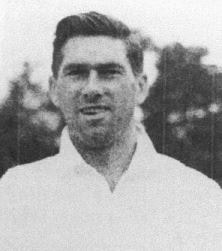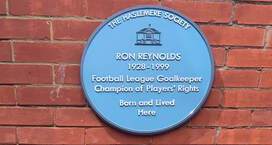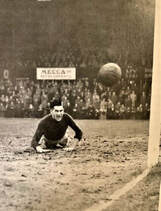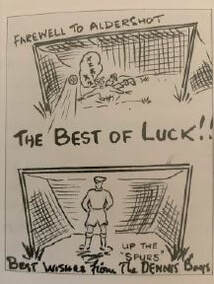
Ron Reynolds: 125 Lion Lane
Ron Reynolds had a successful professional career from the mid-40s until the early 1960s, playing in goal for Aldershot, Tottenham Hotspur and Southampton. The pinnacle of his career came in 1958 when he narrowly missed selection for the team that represented England in the World Cup.
Ron was very much a Haslemere man, living in the town throughout his life, apart from the time when he played for Southampton, when he moved his wife Betty and three children, David, Peter and Amanda.
Football was very much in the family DNA. Ron’s paternal grandfather, Alfie Riddle, played for Small Heath FC before they turned professional and became Birmingham city, and was one of the founders of Shottermill FC, whose ground is now the site of the Tesco supermarket.
During the Second World War, professional football had fallen into abeyance such that all teams needed to rebuild as the war came to an end. Local team Aldershot of course had the advantage of many returning members of the army to draw upon, but nonetheless they scouted locally, and Ron was spotted as a talented young goalkeeper. He signed for the club in early 1945, and on 8th December, turn professional on the princely wage of £6.14 shillings per week, although he continued to retain his day job at Dennis and study for his professional exams.
Despite this unpromising start, he quickly began to build a reputation, ironically enhanced by the somewhat lacklustre performance of the team. Local press cuttings suggest that he quickly gained celebrity status.
Buoyed by this positive press coverage, Ron began to contemplate a career in football for the first time and by the end of 1949 began to look for a transfer to a higher division club. Aldershot at that time were in the Third Division.
The 1949/50 season went extremely badly, and poor results and weakening finance led to a need for action. Ron was the most saleable asset of the club, and was dispatched by the directors to Waterloo station for a meeting to secure his future. Such was his treatment that he thought he was meeting representatives of Arsenal, but in fact it was Tottenham Hotspur and he was swapped with a forward with £3000 moving to shore up Aldershot’s flagging finances.
Ron was to spend all of the 1950s at Tottenham Hotspur and by 1953 had established himself as the number one goalkeeper in the team.
Football in the 1950s was a brutal game: the ball, especially when wet, heavier than today and goalkeepers had neither gloves nor rules to protect them from often intentional injury. Ron’s career began with injury although it was a self-inflicted injury in 1958 when he sliced off the end of his finger by catching it in his garage door that ended his career as the natural first choice for the team. Having played only one game in the 1959/60 season, he leapt at the opportunity to transfer to Southampton, then in the Third Division for a fee of £10,000.
Ron Reynolds had a successful professional career from the mid-40s until the early 1960s, playing in goal for Aldershot, Tottenham Hotspur and Southampton. The pinnacle of his career came in 1958 when he narrowly missed selection for the team that represented England in the World Cup.
Ron was very much a Haslemere man, living in the town throughout his life, apart from the time when he played for Southampton, when he moved his wife Betty and three children, David, Peter and Amanda.
Football was very much in the family DNA. Ron’s paternal grandfather, Alfie Riddle, played for Small Heath FC before they turned professional and became Birmingham city, and was one of the founders of Shottermill FC, whose ground is now the site of the Tesco supermarket.
During the Second World War, professional football had fallen into abeyance such that all teams needed to rebuild as the war came to an end. Local team Aldershot of course had the advantage of many returning members of the army to draw upon, but nonetheless they scouted locally, and Ron was spotted as a talented young goalkeeper. He signed for the club in early 1945, and on 8th December, turn professional on the princely wage of £6.14 shillings per week, although he continued to retain his day job at Dennis and study for his professional exams.
Despite this unpromising start, he quickly began to build a reputation, ironically enhanced by the somewhat lacklustre performance of the team. Local press cuttings suggest that he quickly gained celebrity status.
Buoyed by this positive press coverage, Ron began to contemplate a career in football for the first time and by the end of 1949 began to look for a transfer to a higher division club. Aldershot at that time were in the Third Division.
The 1949/50 season went extremely badly, and poor results and weakening finance led to a need for action. Ron was the most saleable asset of the club, and was dispatched by the directors to Waterloo station for a meeting to secure his future. Such was his treatment that he thought he was meeting representatives of Arsenal, but in fact it was Tottenham Hotspur and he was swapped with a forward with £3000 moving to shore up Aldershot’s flagging finances.
Ron was to spend all of the 1950s at Tottenham Hotspur and by 1953 had established himself as the number one goalkeeper in the team.
Football in the 1950s was a brutal game: the ball, especially when wet, heavier than today and goalkeepers had neither gloves nor rules to protect them from often intentional injury. Ron’s career began with injury although it was a self-inflicted injury in 1958 when he sliced off the end of his finger by catching it in his garage door that ended his career as the natural first choice for the team. Having played only one game in the 1959/60 season, he leapt at the opportunity to transfer to Southampton, then in the Third Division for a fee of £10,000.
Ron described his first season at the Dell as the happiest of his career. Over the next few years the team performed moderately well, reaching the semi-final of the FA Cup in 1963. However, his career ended as it began, in the 10th game of the 1963/64 season against Portsmouth when, witnessed by his son, he dislocated his shoulder and broke his collar bone following a vicious tackle. He would never play again.
He was a formidable Professional Footballers Association representative and was behind many of the perceived insurrections of his more famous soul mate Danny Blanchflower who, together with the likes of Jimmy Hill led the campaign that ultimately lifted the maximum wage of £10 per week just as Ron’s career came to an end.
Although Ron did not benefit from the rapid growth in wages, on retiring from the game, together with his son David, he established and built up a highly successful financial advisory business whose core clientele in the early days were people from the footballing world. He also managed to supplement his wages during his professional career by acting as a coach for a number of private schools including Charterhouse and Eton. He died in 1999 at the age of 71
The cost of the plaque was generously funded through a donation from The Shottermill Great War Memorial Trust. The idea for the plaque came from local resident and former postman, David Silk. Ron was his childhood hero.
He was a formidable Professional Footballers Association representative and was behind many of the perceived insurrections of his more famous soul mate Danny Blanchflower who, together with the likes of Jimmy Hill led the campaign that ultimately lifted the maximum wage of £10 per week just as Ron’s career came to an end.
Although Ron did not benefit from the rapid growth in wages, on retiring from the game, together with his son David, he established and built up a highly successful financial advisory business whose core clientele in the early days were people from the footballing world. He also managed to supplement his wages during his professional career by acting as a coach for a number of private schools including Charterhouse and Eton. He died in 1999 at the age of 71
The cost of the plaque was generously funded through a donation from The Shottermill Great War Memorial Trust. The idea for the plaque came from local resident and former postman, David Silk. Ron was his childhood hero.
For a PDF of the full leaflet on Ron Reynolds Click Here



